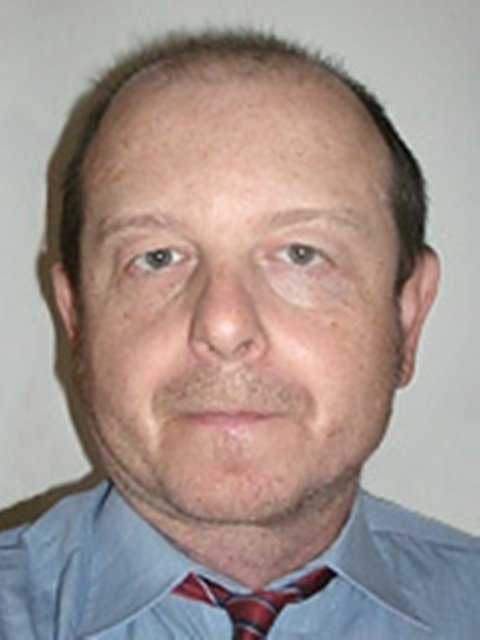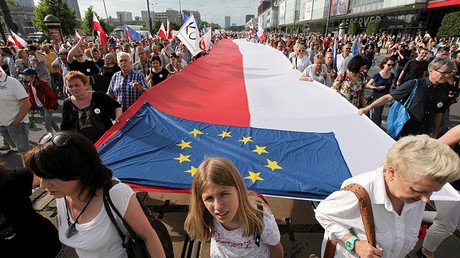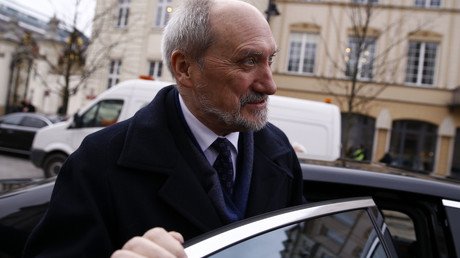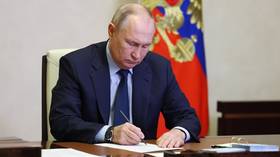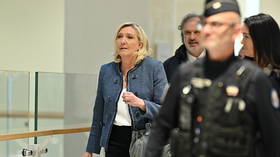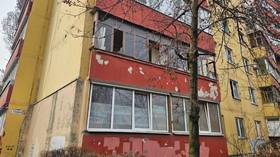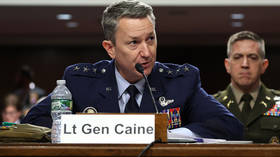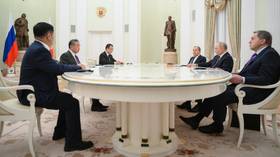In Poland, hammer & sickle being replaced by hammer & cross
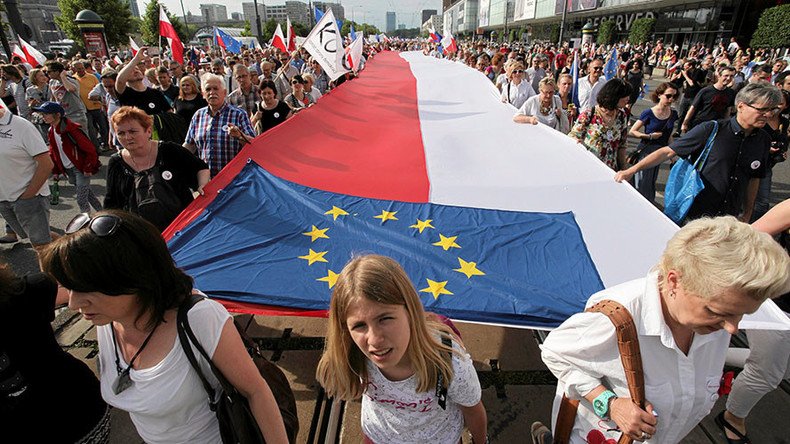
On June 4, which marked the 27th anniversary of historic elections that removed the long ruling Communist PZPR party from power, thousands of people gathered on the streets of 33 Polish cities.
Despite the ruling PiS (Law and Justice) Party's condemnation of the demonstrations and its leader Jaroslaw Kaczynski’s declaration of open rebellion, the events were festive and peaceful in character. In Warsaw, the demonstrations drew two ex-Presidents from previous Polish governments while a third, Lech Walesa, expressed his support to the protesters.
It was a second demonstration in as many months, uniting most of the opposition forces against the PiS and its leader Kaczynski. Despite not holding any elected office, Kaczynski has morphed into the biggest political power player in the country. Many in Poland regard his position of a defacto kingmaker as severe threat to the democratic character of the state.
The PiS ultra-nationalist platform, along with open support from the Catholic Church, has earned it a 2015 electoral victory over the corrupt PO rule of the past 8 years.
However, what is not widely known about the Kaczynski twins phenomenon is their slow but steady rise to power that began with child stardom.
In 1962, the Kaczynski twins starred in a children's film, The Two Who Stole the Moon, a huge hit in Poland. A decade later, they emerged on the political stage as lawyers representing workers against the oppressive Communist government. The government and state owned enterprises used many tactics including trumped-up criminal charges against workers demanding better working and living conditions.
While Jaroslaw joined the KOR (Comittee for Workers Defense), Lech was active on the academic scene teaching the law and galvanizing new recruits for their cause. Later, Jaroslaw decided to join an underground newspaper run by the current Minister of Defense, Antoni Macierewicz, a staunch anti-Communist firebrand. While the Kaczynski twins were connected with the genesis of the Solidarity movement, Lech gained a political footing as adviser to its leader Lech Walesa, who went on to become Poland's president.
The elections of 1989 were pivotal in the Kaczynskis political careers. After a brief stint as editor in chief of Solidarity newspaper, Jaroslaw created his own political party that at the time took its nationalist and anti-communist credo to the limit: the Porozumienie Centrum, the PC (Central Agreement).
It soon became a coalition partner of the newly elected Walesa administration with Jaroslaw getting a job of chief of staff while his brother was appointed a minister for national security. However, Jaroslaw Kaczynski's outspoken extremism became too much for Walesa as he tried to build a political coalition with the left. Walesa and Kaczynski parted ways in a personal feud that still has many shades of hatred to this day.
Meanwhile, the PC needed money for political activities, therefore Kaczynski close confidante Maciej Zalewski who also happened to be a Solidarity newspaper deputy editor and secretary of national defense, created a private media company called Telegraf. Using its political connections the company got financing from state owned banks for its business activities that went beyond its charter as media company. For example it expanded into areas such as trading in cigarettes and other ventures that had nothing to do with its original mission. It also put a political pressure on one of the biggest Polish companies, the ART-B Group while attempting to extort money and by warning it about the impending arrest of its bosses for fraud.
Several years later, Zalewski came to face justice due to his altercation with police during his DUI arrest that resulted in his MP immunity being lifted. Zalewski was sentenced to 2.5 years on extortion charges and was released from prison after serving only 15 months allegedly due to political intervention.
The Telegraf derived income and its corrupt legacy didn't prevent the PC's reincarnation as the PiS, a fully funded and staffed national political party. The PiS first run at power in 2005-7 ended in disaster marred with political infighting and defections while Lech Kaczynski using PiS initial popularity became Poland's president.
In a historic twist without any modern precedent, two twin brothers became the two most important politicians of a European country.
Covering huge anti-Govt demonstration in #Warsaw, #Poland for @AJEnglish. Thousands march to Constitutional Square pic.twitter.com/zFnhOkBmsZ
— Mohammed Jamjoom (@MIJamjoom) June 4, 2016
Subsequently, Lech died in a plane crash in 2010 at Smolensk on the way to commemorate the 70th anniversary of mass killings of Polish officers held in captivity on Stalin's orders. The crash and the corresponding conspiracy theory has become one of the PiS' most important historical narratives and it is used as a cornerstone of its political legitimacy with voters.
The ethos of PiS and its DNA as a classical leader-based party is one of betrayal that took place on June 4th, 1989. It is not only due to fact that Kaczynski uses this historic moment of Polish national memory by treating it as political prop to rally the nation as the losers of the socio-political transition. He questions the sense of its existence equaling it to the sellout of virtues that Poland as Christian country should espouse.
The PiS uses a classic totalitarian strategy of the "year zero" allowing its electorate to believe the real Polish freedom started with the PiS coming to power as result of last fall's electoral success. In this mode the PiS is now the fixer of all wrongs, real or perceived, and it has the political and moral capital to rule as it sees fit without any input from anyone else.
The myth of rebirth through fire of decommunization is used as weapon against the Neoliberal elites that in the PiS' view sold the country out to the highest bidder. The dirty and corrupt elites are then directly responsible for poverty of people who couldn't cope in a new market economy post 1989. However, what is missing in the PiS messaging is complexity of analysis of socio-economic conditions that the country has found itself in. Instead the PiS positions itself in a niche narrative of redemption based on its messianic ethos of biblical "good news".
The pattern works like this: three "evil" neighbors (EU, Germany and Russia) once again conspired for Poland's final partition. However, due to the divine providence the PiS has just arrived on its white horse to stop it. In Kaczynski's zero-sum view of political reality, the opposition to his "good change" as shown by June 4th demonstrations, is driven by Poles who are genetically pre-destined to betray their country and are thus referred to as the so-called "worse sort."
Any argument based on reason and historical analysis doesn't work in this mythology of national salvation, as its founding stone includes a schizophrenic interpretation of not only Polish facts but world history as well. For example, the Solidarity movement Kaczynski alleged was betrayed during the 1989 roundtable talks agreement was practically non-existent. It was decimated in 8 years following the declaration of the Marshall Law in Dec 1981 and it had no real political power.
The Polish Communist government realized that it lost its political legitimacy so it needed a catalyst for national change thus allowing the opposition to be its partner in 1989 round table talks. The PiS sees the wisdom of political revolution through compromise and lack of violence as a sell out regardless of the fact the opposition was by then a narrow band of elitists and careerists. However it had a legend of Solidarity and its enormous popular support but any attempt at the revolutionary overthrow of Poland's government would have most definitely result in Soviet action utilizing military bases on Poland's territory. Also the whole experiment of democracy in Eastern Europe might have come to a bloody end if the 1991 Yanayev coup in Moscow had succeeded and the Soviet Union was brought back on the back of its military power.
As the PiS version of political reality crumbles its moves against the independence of Poland's highest court, the Constitutional Tribunal (TK), to further its vision of political change beyond what is allowed by law. By increasing its control over public media it attempts to use the apparatus of law enforcement as tool of repression against the people who will not go along with charade of the so-called "good change."
In some ways Polish history is slowly turning back into the pre-1989 era, the era of hammer and sickle. The only new element here is a replacement of the sickle with the cross.
The statements, views and opinions expressed in this column are solely those of the author and do not necessarily represent those of RT.
